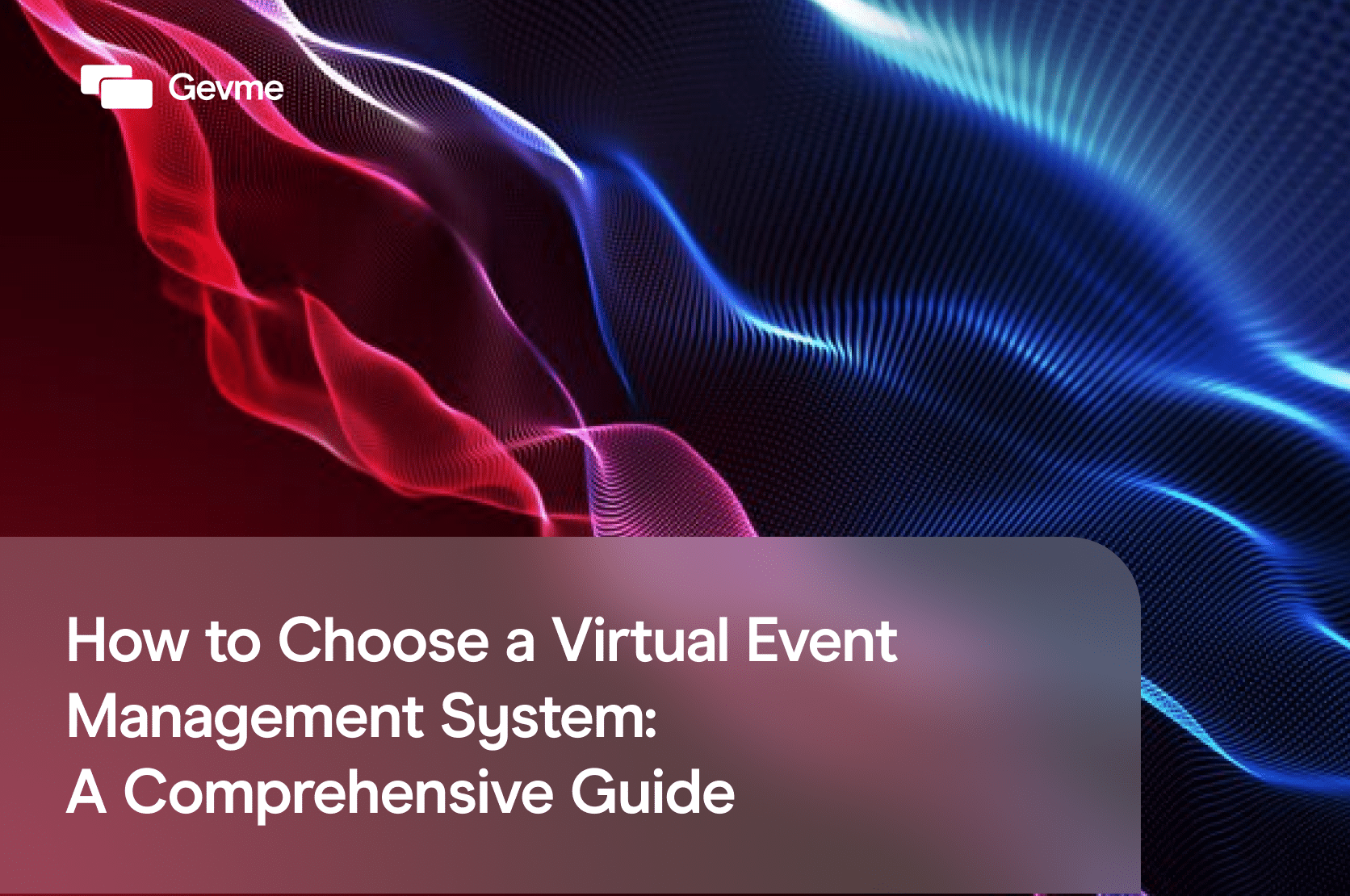In the ever-evolving landscape of events, virtual gatherings have gained unprecedented prominence. Whether it’s webinars, hybrid conferences, or fully virtual expos, the demand for seamless virtual event experiences is on the rise. To meet this demand, event organizers are turning to virtual event management systems. These platforms serve as the backbone of virtual events, providing the tools and features necessary to create engaging and memorable experiences.
However, not all virtual event management systems are created equal. To ensure your virtual events run smoothly and successfully, it’s crucial to choose the right system. In this comprehensive guide, we’ll explore the key features you should consider when evaluating virtual event planning platforms. From user-friendly interfaces to customization options, we’ll delve into the details to help you make an informed decision.

1. User-Friendly Interface
The user interface (UI) of your virtual event management system is the gateway to your event. It should be intuitive and easy to navigate for both organizers and attendees. A user-friendly interface ensures that participants can access event content and interact with ease.
- Intuitive Navigation: The heart of a user-friendly interface is intuitive navigation. Organizers and attendees alike should find it effortless to move around the platform. This means a streamlined menu structure and clear, concise labels that guide users to their desired destinations.
- Accessibility: Accessibility features are essential for an inclusive event experience. The platform should be designed to accommodate a wide range of users, including those with disabilities. Features like screen reader compatibility and keyboard navigation can make a significant difference.
- Responsive Design: In the era of diverse devices, a responsive design is a must. Your virtual event planning platform should adapt seamlessly to various devices, including smartphones, tablets, and desktops. A responsive design guarantees a consistent and enjoyable experience across the board.
2. Customization Options
Your virtual event should reflect your brand identity and theme. Customization options play a vital role in achieving this.
- Branding: The ability to incorporate your branding elements such as logos, colors, and fonts into the event platform is essential for creating a cohesive brand experience. Your attendees should instantly recognize your event’s identity.
- Themes and Templates: While branding is crucial, you also need flexibility in design. Look for systems that offer a variety of themes and templates. These allow you to choose a design that aligns with your event’s aesthetics, ensuring a visually appealing and memorable experience.
- Branding Options: Some platforms go the extra mile by offering advanced branding options. These may include the ability to create custom landing pages and microsites tailored to your event’s unique theme. Such features can elevate your event’s overall presentation.

3. Registration and Ticketing
A seamless registration process is the foundation of any successful virtual event. Attendees should be able to register quickly and securely.
- Streamlined Registration: A complex registration process can deter potential attendees. Look for systems that offer a streamlined registration process with minimal steps. Clear instructions and guidance should accompany each registration step.
- Flexible Ticketing: Different events require different ticketing options. Ensure that the platform allows you to create various ticket types, including free, paid, and tiered tickets. Flexibility in ticketing caters to diverse attendee needs and event types.
- Integration with Payment Gateways: The registration process often culminates in ticket sales. To facilitate this, your virtual event management system should integrate seamlessly with secure payment gateways. Attendees should be able to make payments confidently and conveniently.

4. Interactive Tools and Engagement Features
Virtual events thrive on attendee engagement. Interactive tools and features are essential for fostering interaction and participation.
- Q&A Sessions: Engaging attendees with live Q&A sessions is a powerful way to create an interactive atmosphere. Attendees can ask questions and interact with speakers and presenters in real-time. The platform should offer robust Q&A capabilities that allow for seamless interaction.
- Polls and Surveys: Gathering attendee feedback and opinions is invaluable. Interactive polls and surveys can achieve this while keeping attendees engaged throughout the event. Ensure that the platform supports the creation and management of polls and surveys.
- Live Chat and Networking: Networking opportunities are a major draw for many events. Look for systems that offer live chat functionality, enabling attendees to network and interact with each other. This feature can replicate the spontaneous conversations and connections that occur at physical events.
- Gamification: Gamification elements add an element of fun and competition to virtual events. Systems that incorporate gamification features encourage attendees to participate actively, earn rewards, and enjoy the event experience to the fullest.
5. Content Management and Delivery
The way your event content is managed and delivered can greatly impact the attendee experience.
- Content Organization: A well-organized content structure is essential. Attendees should find it easy to locate sessions, resources, and information. A comprehensive content organization system ensures attendees can quickly access what they need.
- Live and On-Demand Sessions: Virtual events often include a mix of live and on-demand content. The platform should support both formats seamlessly. Live sessions should have robust streaming capabilities, while on-demand content should be readily available and easy to access.
- High-Quality Streaming: For virtual events, the quality of audio and video streaming is paramount. Look for systems that offer high-quality streaming options to deliver content without interruptions or degradation in quality. Reliable streaming contributes to a professional and engaging event experience.
6. Analytics and Reporting
Data-driven insights are essential for understanding attendee behavior and event performance.
- Attendee Engagement Metrics: Tracking attendee engagement metrics provides crucial insights into the effectiveness of your event. Look for systems that allow you to monitor metrics such as session attendance, participation in polls, and interaction with content. Detailed engagement data helps you gauge the success of your event and make improvements for future iterations.
- Registration and Ticketing Data: Understanding your attendee demographics and ticketing data is essential for planning and marketing future events. Robust analytics should provide insights into registration numbers, ticket sales, and revenue generated.
- Audience Feedback: Some platforms offer attendee feedback mechanisms that allow you to gather post-event insights. Feedback forms and surveys can provide valuable information about attendee satisfaction, preferences, and areas for improvement. Utilizing feedback effectively can lead to more successful future events.
7. Security and Privacy
The security and privacy of your virtual event attendees’ data are paramount considerations. Ensuring that your virtual event management system offers robust security measures and respects privacy regulations is essential.
- Data Encryption: Look for a virtual event management system that employs state-of-the-art data encryption methods. Data transmitted and stored within the platform should be protected with advanced encryption protocols. This ensures that attendees’ personal and financial information remains secure.
- Compliance: Data protection regulations, such as the General Data Protection Regulation (GDPR), are critical. Verify that the platform complies with these regulations to safeguard the privacy rights of your attendees. Compliance demonstrates a commitment to data protection and legal transparency.
- Secure Access: Implementing secure access controls is a fundamental security measure. The platform should offer robust authentication methods to prevent unauthorized access to sensitive event data. Multi-factor authentication (MFA) and secure login procedures bolster security.
- Data Retention and Deletion: Clear data retention and deletion policies should be in place. Attendees have the right to know how their data is handled and have the option to have their data removed when necessary. Ensure that the platform provides tools and processes for data management in compliance with data protection laws.
- Secure Payment Processing: For events with paid tickets or transactions, the payment processing system must be secure and PCI DSS compliant. Attendees should feel confident when making payments, knowing that their financial data is protected.

8. Integration Capabilities
A well-rounded virtual event planning platform should seamlessly integrate with other software and tools. This enhances the overall functionality of your virtual event and allows for a more holistic approach to event management.
- Third-Party Integrations: Evaluate the platform’s compatibility with third-party tools and applications. Integration with popular applications such as Zoom for webinars, Salesforce for customer relationship management, Mailchimp for email marketing, and others can streamline event management processes.
- API Access: Some virtual event management systems offer API access, enabling you to create custom integrations tailored to your specific event needs. This level of customization can greatly enhance the capabilities of your event platform.
- Compatibility: Compatibility matters. Ensure that the platform works seamlessly across various operating systems, web browsers, and devices. A platform that is universally accessible ensures that all potential attendees can participate in your virtual event.
9. Mobile Accessibility and App Support
In an increasingly mobile-centric world, ensuring that your virtual event management system offers robust mobile accessibility and app support is crucial.
- Mobile Apps: Some virtual event platforms offer dedicated mobile apps for both organizers and attendees. These apps provide a user-friendly mobile experience, allowing attendees to access event content and interact on-the-go.
- Responsive Mobile Web Design: If the platform doesn’t have a dedicated app, it should, at the very least, offer a responsive design that optimizes the event experience on mobile devices. This ensures that attendees can participate seamlessly on smartphones and tablets without sacrificing functionality.
- Offline Access: Mobile apps may offer the ability to download and access event content offline. This feature is valuable for attendees who may have limited internet connectivity during the event.
- Push Notifications: Push notifications through mobile apps can keep attendees informed about event updates, upcoming sessions, and important announcements in real-time, enhancing their overall event experience.
10. Technical Support and Customer Service
Technical support and customer service are pivotal aspects of a virtual event management system. The availability of reliable support can make a significant difference in your event planning and execution.
- Responsiveness: Choose a platform that provides responsive customer support. When issues or questions arise, timely assistance is crucial. Look for platforms that offer multiple support channels, including email, live chat, or phone support.
- Resource Availability: Beyond direct support, a knowledge base, online tutorials, and user guides can be invaluable. These resources empower event organizers and attendees to use the platform effectively and troubleshoot common issues independently.
11. Pricing Models and Scalability
Pricing models and scalability options can vary significantly among virtual event management systems. Evaluating the cost and scalability of a platform is essential to align it with your budget and event size.
- Pricing Models: Explore different pricing models offered by virtual event management systems. These may include free trials, monthly or annual subscriptions, pay-per-use models, or tiered pricing based on the number of attendees or features. Carefully assess the pricing model that best suits your event’s needs.
- Scalability: Consider the platform’s scalability capabilities. Events come in various sizes, from small webinars to large conferences. Ensure that the platform can scale accordingly to accommodate the number of attendees and the complexity of your event.
12. Case Studies and Success Stories
Real-world examples and success stories provide insights into the effectiveness of a virtual event management system.
- Customer Testimonials: Look for customer testimonials and case studies from organizations that have successfully used the platform for their virtual events. These firsthand accounts offer valuable insights into the platform’s capabilities and real-world performance.
- Use Cases: Assess the variety of use cases that the platform has successfully served. The platform’s versatility in handling different event types, such as webinars, virtual conferences, hybrid events, workshops, and more, is indicative of its adaptability and robustness.
Elevate Your Virtual Events with Gevme
As you embark on your journey to host successful virtual events, it’s essential to choose the right virtual event management system. Enter Gevme, a comprehensive event management platform, and your partner in crafting unforgettable virtual experiences. With a strong commitment to excellence and a proven track record, Gevme has empowered countless organizations to create seamless, engaging, and secure virtual events.
Unlock the potential of virtual events with Gevme and take your online gatherings to the next level. Join the ranks of satisfied users who have leveraged the power of Gevme to experience the benefits of virtual events and make their gatherings stand out.








